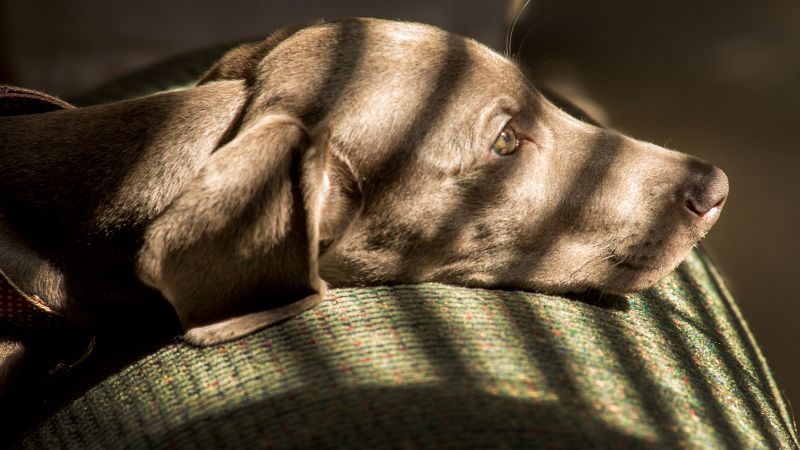
If you’ve ever caught your furry friend staring into space, you might have found yourself puzzled. Dogs are known for their quirky behaviors, and that vacant gaze can leave you wondering what’s going on in their minds. Understanding why your dog stares at seemingly nothing can shed light on their behavior, offering insight into their needs and well-being. In this text, we’ll explore the various reasons your dog might be gazing off into the distance, from natural instincts to potential health concerns.
Why Does My Dog Stare at Nothing?
Superior Senses
Dogs experience the world quite differently from we do, relying heavily on their superior senses. Their eyesight is powered by a higher number of rod cells, allowing them to detect movement and see in low light. When your dog stares at nothing, they may be observing something just beyond your perception, a flicker of movement, a sound that catches their ear, or even something in the air. Their ability to sense subtle shifts in their environment can cause them to stare at seemingly ordinary spaces.
Seeking Attention
Sometimes, your dog’s vacant stare serves a practical purpose: they might simply be trying to get your attention. Dogs are smart enough to recognize when their humans are preoccupied. If they’re gazing at a wall or a corner of the room, they could be signaling that they’re bored, hungry, or in need of a bit of love and playtime. If you notice this behavior, a gentle call or a hopeful pat can quickly redirect their focus and stop your dog from staring at the wall.
Canine Cognitive Dysfunction
As dogs age, they can experience cognitive dysfunction syndrome (CDS), which is similar to dementia in humans. Dogs with CDS may display unpredictable behavior, including staring at walls or other objects for extended periods. This can sometimes manifest as a compulsive behavior, where the dog seems unable to break its focus. If your dog’s staring is accompanied by other signs, such as confusion, disrupted sleep patterns, or changes in eating habits, it might be necessary to consult your veterinarian for advice.
Past Events & Memory
Dogs have strong associative memories. If they associate a particular spot with a past event, whether negative or positive, their gaze might linger there. This behavior can be particularly evident in rescue dogs or those with a tragic history. The staring can be a reminiscence, where they recall smells or sounds from their past. In some cases, this fixation can even be a sign of anxiety related to a past trauma.
Boredom or Daydreaming

Much like humans, dogs can get bored, especially if they aren’t adequately stimulated. If your dog repeatedly stares at nothing, it could simply be daydreaming, or wondering when they’ll get their next play session. Ensuring they have enough toys, activities, and regular exercise can reduce boredom and curb excessive staring.
Underlying Medical Issues
In some cases, a dog’s fixation can indicate underlying medical issues. Conditions affecting eyesight or neurological problems can manifest through unusual staring behavior. If your dog’s gaze seems unfocused or if you notice other concerning signs, such as changes in behavior or alertness, it’s essential to seek veterinary advice to rule out serious health concerns.
When to Be Concerned: Red Flags
While it’s common for dogs to stare off into space occasionally, there are certain signs that should raise a red flag. If your dog combines their vacant gaze with any of the following symptoms, it may be time to contact a vet to address concerns about your dog’s health:
- Uncharacteristic Aggression: If your normally friendly dog seems irritated or aggressive, it could signal cognitive issues.
- Disorientation: Staring often accompanied by aimless wandering or confusion can be a sign of CDS.
- Change in Appetite: A sudden loss of appetite or a change in drinking habits can be significant indicators of health issues.
- Changes in Elimination Habits: Incontinence or unexpected accidents might suggest a medical concern.
- Vocalization Changes: If your dog begins to whine, bark, or howl when staring, it could indicate discomfort or anxiety.
If your pet exhibits any of these behaviors alongside their staring, contacting a veterinarian is advised for a thorough evaluation.
What to Do Next
If your dog’s staring behavior is frequent and concerning, here are some steps you can take to address the issue:
- Observe and Document: Keep track of when and where your dog tends to stare. Note accompanying behaviors or any triggers that seem to precede the staring episodes, which can aid your veterinarian in diagnosing potential issues.
- Provide Stimulation: Engage your dog with new toys, training sessions, or outdoor activities. Mental stimulation can reduce boredom, leading to less staring.

- Routine Checkups: Regular veterinary visits are crucial, especially as your dog ages. Discuss any unusual behaviors with your vet to rule out health problems.
- Create a Comfortable Environment: Ensure your dog has a safe space to retreat to if they’re feeling overwhelmed or anxious.
- Consult a Trainer or Behaviorist: If the problem persists, a professional trainer or behaviorist can offer individualized strategies to help your dog.
Frequently Asked Questions
Why does my dog stare at nothing for long periods?
Dogs may stare at nothing due to their acute senses picking up subtle movements or sounds. This behavior can also indicate boredom, need for attention, or even cognitive dysfunction as they age.
What does it mean when my dog stares at a wall?
If your dog is staring at a wall, they might be recalling a past event associated with that spot, or they could simply be bored, seeking attention, or experiencing health issues. It’s essential to monitor their behavior.
How can I tell if my dog’s staring is a sign of health issues?
If your dog’s staring is accompanied by confusion, changes in appetite, or unusual vocalizations, it may indicate a health problem. Consulting a veterinarian can help rule out serious conditions.
What should I do if my dog frequently stares off into space?
Observe and document when your dog stares and what triggers it. Increase their mental stimulation through toys and training, and ensure they have regular veterinary checkups to address potential health concerns.
Can boredom cause my dog to stare at nothing?
Yes, dogs can become bored, leading them to stare blankly into space. Providing them with more toys and activities can help reduce this behavior and keep them engaged.
Is my dog’s staring behavior normal, or should I be worried?
Occasional staring is normal, but if it’s combined with unusual behaviors like aggression, disorientation, or changes in appetite, it’s important for pet owners to consult a veterinarian to rule out cognitive dysfunction or other health issues.
Conclusion
Summarizing, while it may seem odd when your dog stares at nothing, the reasons often range from natural instincts to emotional needs or health concerns. Understanding this behavior is key to ensuring your dog remains healthy and happy. If you’re ever in doubt, don’t hesitate to consult with your veterinarian for further guidance. By staying attuned to your dog’s behavior, you can enhance their well-being and strengthen the bond that exists between you.



